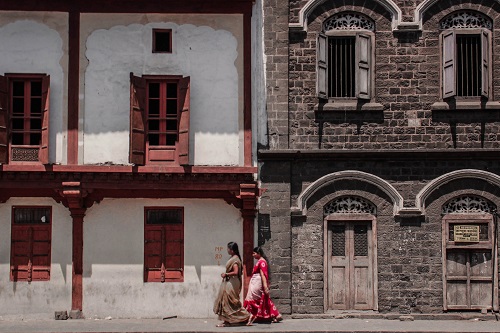Aman Bhargava photo
By
Ananya S Guha
The inner paradoxes that are in the body politic of our India is all too evident. On the one hand we are again and again reiterating the secular ideals of a nation and its rightful diversity. On the other hand we are trapped in this diversity, by proclaiming again and again that history of the country was distorted and the enormous wrong must be righted. True of course, that the history of the country represented in the past was North centred, paying little attention to the Southern, or for that matter, the North Eastern regions of the country. The northern domination came to be represented as a clash between Muslim and Hindu rulers, be they Marathas or Rajputs.
So the paradox of in letter and in spirit continues to live in a conflict. We mouth the platitude of secularism, but practice the ideology of sectarianism. There are many who are lamenting this, and vocally protesting against it. The time has come to take stock and find out whether things are going from bad to worse, or have matters improved in terms of economy, corruption, and overall functioning of government departments. In between is the great debate raging on nationalism, its meaning and the relationship it bears, or does not with the professed secularism. Certain radical changes in terms of cleansing the currency and imposition of the goods and services tax have resulted in both criticism, and appreciation. Three years some say, is enough for a government to make changes. Are these changes visible, or can they take place in such a short space?
Education and health, many contend, are the two crucial points for the well being and development of a nation. What has been happening to them in the past, some query. After all, we are seventy years old.
The questions that come to mind, to the apolitical are: what is the condition of poverty, has it decreased? What development has taken place, in rural areas, in terms of housing or, communication? Has the rural urban divide lessened? If we are talking about internet connectivity, what is the state of road connectivity, in intractable areas, say of North East India. True, how are we going to overcome problems in accessibility of education, wipe out teacher absenteeism and look at education for drop outs and street children? Health care suffers a similar fate of apathy and neglect. Anyone having even an iota of love for the country, must look at these matters dispassionately. But what is unfortunately happening is that both rightists or leftists are not rising above petty party politics. And, some of the intellectuals, writers and artists. No one is willing to position, oneself in an objective and unbiased manner. It is either this side or that, mine or yours, thus dividing not only the body politic but intellectual opinion in the country. If you constantly point fingers at what is not done, why don’t you go and do it yourself, with ‘likeminded’ friends? Taking recourse to social media, by giving vent to your anger, is no concrete fall out.
The positioning is something like this: my way of an essential patriotism is this, yours is different, your nationalism is different from mine, your reading and interpretation of history is wrong, subversive, mine is right, etc. So we shout at each other, especially on television platforms. In the midst of it lying totally unnoticed is the poor Indian, who is perhaps not interested in such debates, but is struggling hard, braving adverse and deleterious weather conditions, whether it be the heat, or the floods, to simply eke out the meals of a day. Just above this is the unorganised sector, the petty trader or the shopkeeper. Then we have the middle class, whose grouse is endless, where the rungs of a social and economic ladder have to be climbed, with much bravado.
The problem is, rising above party and partisan politics, viewing matters with circumspection and objectivity, and thinking seriously about changing the condition of the poor, the labourer, the struggling artisan, or the welder and the small shop keeper. We are being heaped with statistics from all sides. What will it help? To write erudite papers? To inundate the statistical bureau with more information, with no action taken? For example we are hearing again and again, that the gross enrolment ratio in education is abysmally low. But what about retention, after this? Can anyone quote the actual figures?
So the battle of wits is transformed into the battle of halfwits or nitwits. Can anyone tell me whether a study on GST has been done to show who are affected, or who actually benefits? A shop keeper says he has been paying to the company, but the wholesaler in guise of the middleman can be a constant shadow. All these must be clearly specified, in terms of a white paper, or whatever you call it. Intellectuals, economists, must go into a mode of enquiry, dispassionately, forgetting the other, a syndrome haunting the country in all measures. The rancorous arguments continue. The poor man continues to suffer. In this midst we have catapulting figures of growth. Of what, poverty?
”Lies, damned lies, statistics.” The country continues- to suffer and bleed. Damn it, diversity and unity! and let the idiot box continue to spawn more idiots.
Ananya S Guha
Ananya S Guha was born and brought up in Shillong, North East India. He has seven collectionsof poetry and his poems have been published worldwide. They have also been featured in several anthologies. He is also a columnist, critic and editor. He now is a Regional Director at the Indira Gandhi National Open University and holds a doctoral degree on the novels of William Golding.



No Comments Yet!
You can be first to comment this post!